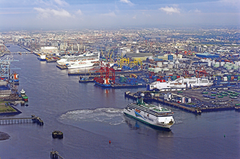New ports policy demands value for money
 Transport Minister Leo Varadkar has announced a major overhaul of ports policy with the Government taking a more active role as a shareholder and allowing a larger role for the private sector. Ireland has 19 ports which handle commercial freight.
Transport Minister Leo Varadkar has announced a major overhaul of ports policy with the Government taking a more active role as a shareholder and allowing a larger role for the private sector. Ireland has 19 ports which handle commercial freight.
“I am firmly of the view that government must be a more active and demanding shareholder,” Varadkar stated. “This will include a re-emphasis on the ports’ commercial remit with a requirement that they adhere to a dividend policy and invest and develop on a sound commercial basis.
“While no ports are earmarked for privatisation, private sector investment and involvement will be encouraged.”
The new national ports policy designates five ports of national significance: Dublin, Cork, Shannon Foynes, Rosslare and Waterford. The other 14 have a regional significance and local authorities will take shareholdings in them.
All ports will retain their commercial mandate. Investments in deep water capacity will only be approved after “stringent analysis” by the Department of Transport, Tourism and Sport.
Irish Maritime Development Office Director Glenn Murphy said that the policy “provides clarity” for port companies and the Irish and international companies “that depend every day on effective and efficient ports to connect their business with the global economy.”
Varadkar added: “Too many governments have taken a one-size-fits all approach to our ports sector. We want to end this laissez-faire approach and encourage shareholders to take a much more hands-on attitude to maritime ports.”





